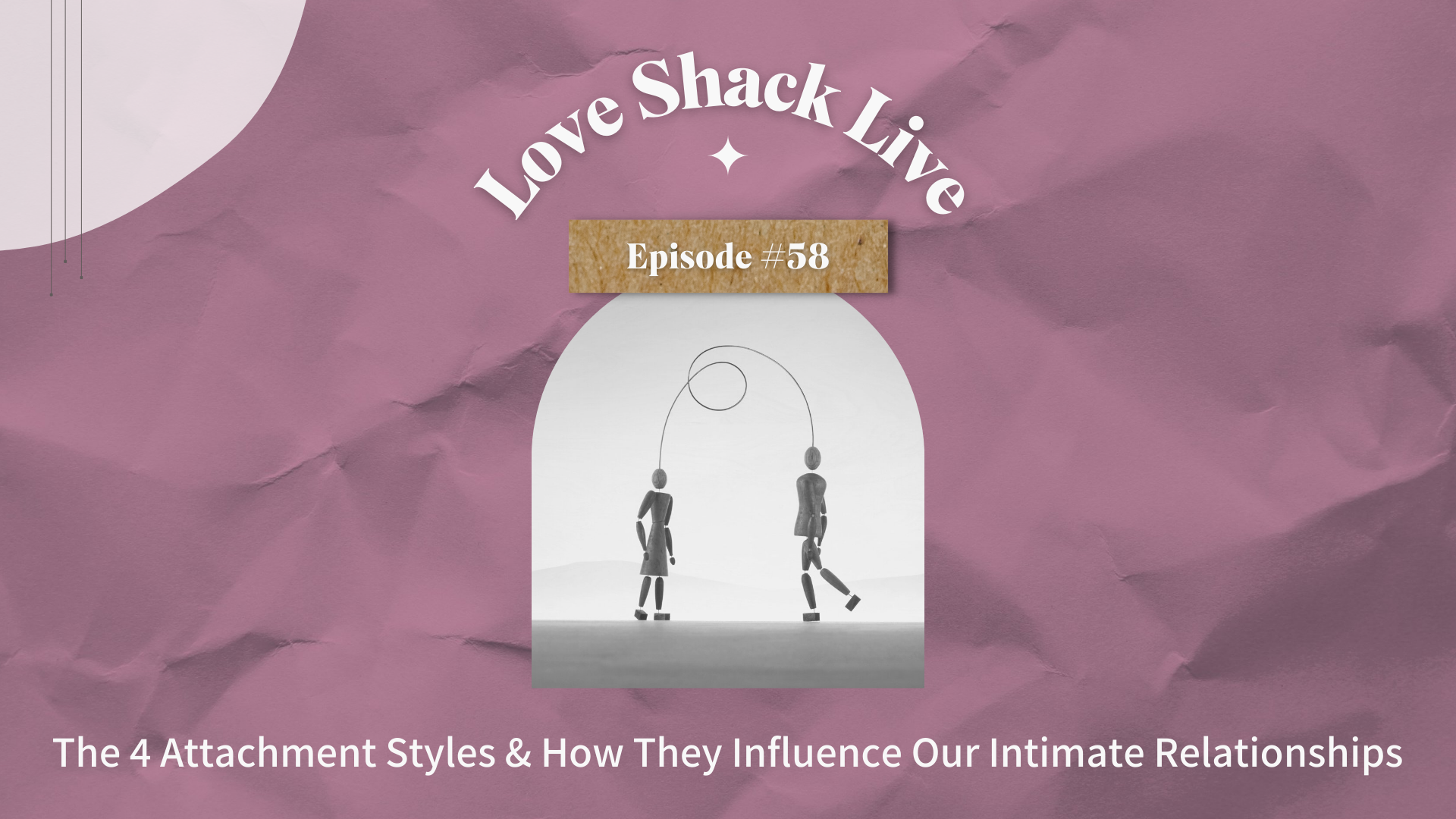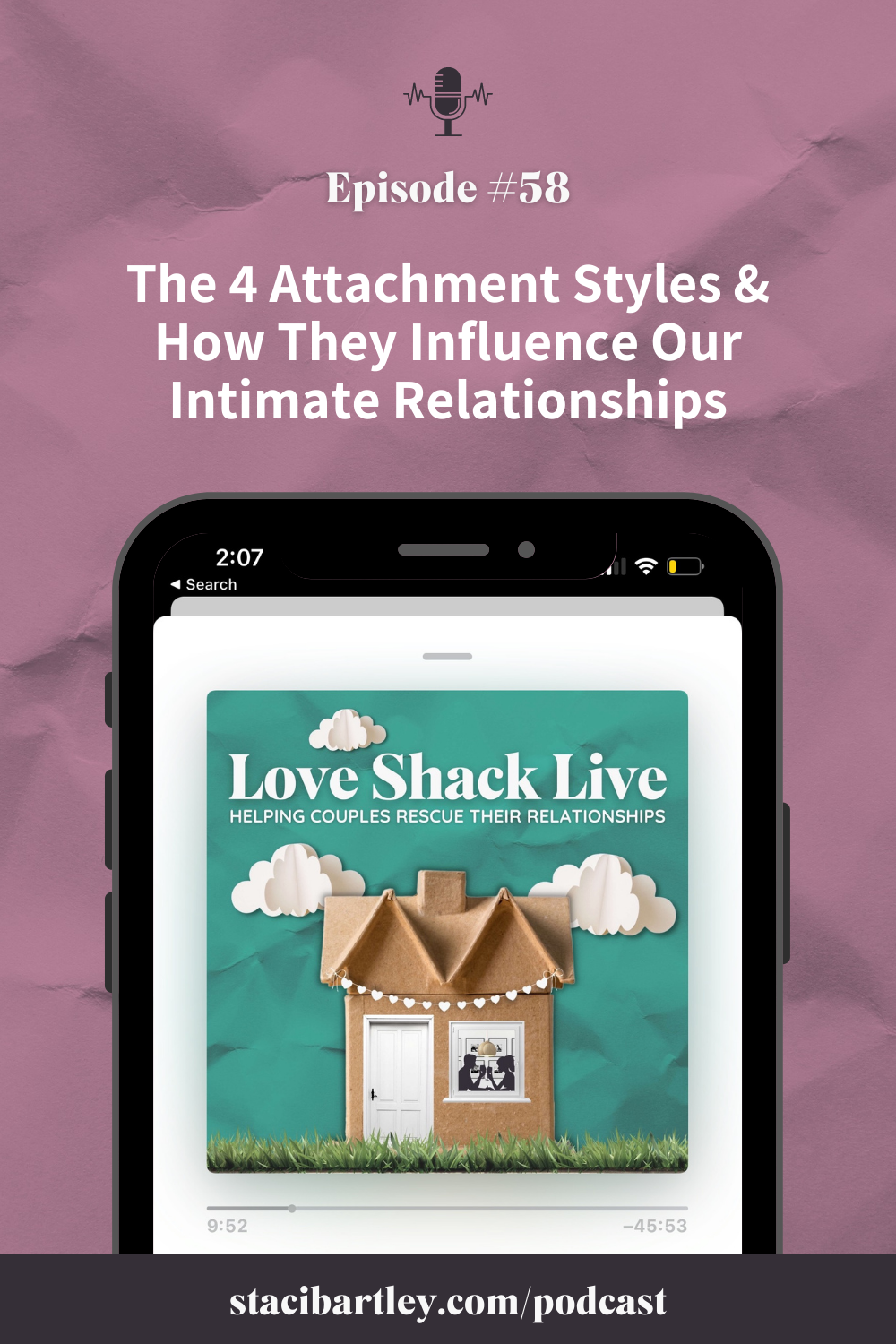Episode 58: The 4 Attachment Styles & How They Influence Our Intimate Relationships

Are you struggling in your relationship? Do you feel like you can't seem to get it right? Well, attachment styles help you start to see why you do the things you do, and help you to understand your partner more.
Attachment theory is the joint work of John Bowlby and Mary Ainsworth. Later on in the 1980s, psychologists Cindy Hazan and Phillip Shaver applied the work of Ainsworth and Bowlby to adult romantic relationships, and this created the understanding of the adult attachment styles we are familiar with now.
Their important work helps us in understanding why so many of us have a hard time navigating feelings of attachment in our intimate relationships. If you're seeking couples therapy or tips and tricks to improve your marriage, then understanding attachment styles is a great place to start. In this episode of Love Shack Live, we talked all about how attachment styles can help us gain a better understanding of how we show up in our marriages and relationships.
The Four Attachment Styles:
Secure - This attachment style describes how we want to experience our relationships with one another. If you are securely attached, you feel connected to your partner in a way that is healthy and strong. You know they will be there for you when you need them most.The confident trust that a securely attached person feels is inspiring. You feel seen and understood, but also free to be yourself. The feeling of being totally accepted by your partner is a wonderful thing.
Anxious - This attachment style describes how you experience your emotional reactions to perceived threats in your relationships. This attachment style is the fastest of all 4 styles to react to distress, and it's an extremely common attachment style.
Avoidant - This attachment style describes how you detach yourself from your partner or close friends when you feel threatened by their needs. This doesn't mean that avoidant people never seek out their partner for comfort, but they usually expect judgment or rejection. Very often, people with Avoidant and Anxious attachment styles will pair up. I see this time and time again with my private clients.
Disorganized - The disorganized attachment style is a complicated one. It's not as simple as being secure or avoidant or anxiously attached. People with this attachment style can display characteristics of all four styles at different times depending on how they are feeling in the moment and what their partner is doing to them. It's hard for those who have been close to someone with a Disorganized Attached Style to understand why they do the things they do, but it usually has something to do with feeling threatened by closeness and intimacy. This attachment style is the least understood of them all, and it's thought to be the rarest.
Wondering which attachment style you are? We gave a quiz live on the show!

For many couples, attachment styles are one of the ways they better understand their relationships. Attachment styles can show up in many ways, but some of the easiest to spot are:
- Feeling insecure or worried about separation.
- Worrying too much about partner's whereabouts.
- Holding onto irrational beliefs like "I am too much for my partner to love."
- Avoiding intimacy by keeping secrets or keeping busy.
- Focusing on ‘proving’ yourself for your partner's love.
- Avoiding conflict so you don't have to deal with hurt or rejection.
In this episode we're covering several ways attachment styles can affect our intimate relationships, including:
- What the three main attachment styles are and how they can manifest in relationships.
- The ways you can work with your partner to make changes if your attachments styles are causing conflict.
- Tools and skills to create a healthier relationship.
Why would you want to understand your attachment style more?
When you understand your attachment style, it can help you become aware of the patterns in your relationship. Learning about attachment styles can help you understand if there is a better way to interact with your partner when you feel insecure anxious, or uneasy in any way.
A better understanding of attachment styles can help you know how to be the best self for your partner, so resolving conflict can become easier. It's about learning to get more comfortable with being vulnerable. Building trust by understanding each other better will allow you and your partner to become closer together over time.
As attachment styles play a role in all close relationships, it's important to stay mindful of what works for you and your spouse when you're feeling anxious, upset, or frustrated. If you find that your anxiety is getting the best of you and you often feel like nothing is working, consider reaching out to me for help to learn skills that can help you overcome attachment-related challenges in your relationship. (A great first step would be to register for my new on-demand workshop here!)
Episodes like these only scratch the surface of understanding attachment. But for now, if you'd like to know more about how attachment style shows up in your relationship and what you can do about it - tune in! 🙂
Have You Subscribed Yet?
The Love Shack Live Show is a weekly podcast that explores all things relating to helping couples rescue their relationships. We're diving deep in every episode, exploring the dynamics of what makes a healthy relationship in a fun way! Subscribe to the podcast on iTunes, Spotify, Google or anywhere you get your podcasts!
Links mentioned in show:
- New Free Masterclass: The 4 Step System To Save Your Marriage - Reserve your spot here.
- Relationship Check-up - tired of re-hashing your issues with your partner without making progress? Schedule your check-up today!
- Get on the fun list here.
- Check out our Love Shack Live Playlist for all the songs we play on the show.

[…] had a chance to calm down. If you have an anxious attachment style, this can be difficult, I know. Learn more about attachment styles here. But, it's the best thing you can do in this situation because nothing will get resolved when you take your anxiety out on your partner.[…]
Well done! yes, taking a pause, and calming down is an important first step whenever you feel like your likely to say or do something your going to regret latter.